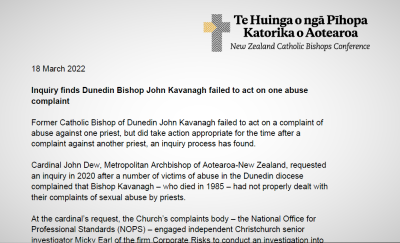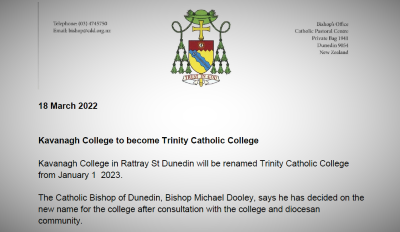Inquiry finds Dunedin Bishop John Kavanagh failed to act on one abuse complaint

Former Catholic Bishop of Dunedin John Kavanagh failed to act on a complaint of abuse against one priest, but did take action appropriate for the time after a complaint against another priest, an inquiry process has found.
Cardinal John Dew, Metropolitan Archbishop of Aotearoa-New Zealand, requested an inquiry in 2020 after a number of victims of abuse in the Dunedin diocese complained that Bishop Kavanagh – who died in 1985 – had not properly dealt with their complaints of sexual abuse by priests.
At the cardinal’s request, the Church’s complaints body – the National Office for Professional Standards (NOPS) – engaged independent Christchurch senior investigator Micky Earl of the firm Corporate Risks to conduct an investigation into abuse complaints in the Dunedin diocese while Bishop Kavanagh was in office from 1957 to 1985.
Mr Earl’s report has been considered by the NOPS Complaints Assessment Committee under the Church’s A Parth to Healing process, and then by Cardinal Dew as the final arbiter.
“The records showed that seven priests, two brothers and one lay teacher sexually abused children and in one case an adult during Bishop Kavanagh’s time as Bishop of Dunedin,” says Cardinal Dew.
“The investigation found that Bishop Kavanagh knew of complaints related to two priests: Father Freek Schokker in about 1963; and Magnus Murray in about 1972. He did not know of the other cases, because complaints were not made until some years after Bishop Kavanagh had died.
“In the case of Murray, the Complaints Assessment Committee found that Murray admitted abuse to Bishop Kavanagh and was sent to Australia for treatment,” said Cardinal Dew. “Because of that admission, and by sending Murray for treatment, Bishop Kavanagh did what he was required to under the Church canon law at the time.
“In the case of Father Schokker, Bishop Kavanagh should have investigated the complaint, but failed to do so,” Cardinal Dew added.
Father Schokker was a priest from the Netherlands working in the diocese at the time of the complaint. He was accused of abusing two young people. He left New Zealand at some stage after the complaint. He died in the Netherlands in 1993, age 81.
Magnus Murray became a priest in the Auckland Diocese in 1979 after returning to New Zealand. He was jailed for five years in 2003 after admitting 10 offences against four Dunedin boys from 1958 to1972. Murray was laicised – removed from the priesthood – in 2019, and lives in a rest home.
Cardinal Dew has formally written to the Bishop of Dunedin, Michael Dooley, telling him of the findings.
“There has been considerable public interest in this inquiry,” said Cardinal Dew. “Survivors of abuse committed in the Dunedin diocese have called for Kavanagh College in Dunedin to be renamed, based on their belief that Bishop Kavanagh did not act properly on complaints of abuse. The outcome of the inquiry is that Bishop Kavanagh failed to act as required at the time on one of the two complaints he knew of. It is now for Bishop Dooley to decide the future of the name of the college.
“I accept that some survivors may not be happy with the decision that Bishop Kavanagh acted properly in respect to Magnus Murray. But that was in the context of canon law of the time. We take immediate action on complaints of abuse today. We are committed to a safe environment for all within the Church community.
Any form of abuse, misconduct or inappropriate behaviour is not acceptable,” said Cardinal Dew.
Cardinal Dew urges anyone who has any concerns regarding inappropriate behaviour or abuse in a Church setting to contact NOPS or the police: “NOPS operates independently of diocesan and Congregation structures. As in the Bishop Kavanagh inquiry, NOPS contracts professional, experienced and independent third-party investigators to conduct investigations on its behalf.”
NOPS can be contacted by free phone on 0800 114 622, or by email at prof.standards@nzcbc.org.nz The NOPS website, which includes the latest edition of A Path to Healing, is here.
Kavanagh College to become Trinity Catholic College

Kavanagh College in Rattray St Dunedin will be renamed Trinity Catholic College from January 1 2023.
The Catholic Bishop of Dunedin, Bishop Michael Dooley, says he has decided on the new name for the college after consultation with the college and diocesan community.
It follows an inquiry finding that the late Bishop John Kavanagh – after whom the college is named – did not act on a complaint of abuse when he was Bishop of Dunedin from 1957 to 1985.
“A number of survivors of abuse in the Dunedin diocese have asked me to change the name of the college,” says Bishop Michael.
In 2020, the Catholic Metropolitan Archbishop of New Zealand, Cardinal John Dew, requested an inquiry from the Church’s National Office for Professional Standards into Bishop Kavanagh’s handling of complaints. Cardinal Dew announced today that the inquiry has found Bishop Kavanagh had not acted on a complaint against a priest from Europe, Father Schokker, but had acted under the church canon law of the time on a complaint against former priest Magnus Murray, by having him sent to Australia for treatment. Murray was eventually convicted and jailed in 2003 for abusing four Dunedin boys from 1958 to 1972.
“Given that Magnus Murray then went on to abuse other children after returning from Australia, I believe the Church at the time let victims down badly. The issue is the attitude of the Church at the time which often did not believe victims of abuse and made it difficult to pursue justice and the protection of children and vulnerable adults,” says Bishop Michael.
“Having the college named after the bishop of that time represents for a number of people the systemic failures of that time and contributes to their trauma. I would hope that the renaming of the college will contribute to some healing and reaffirm our desire as a church to listen to victims of abuse and work hard to provide a safe environment for those in our care.
“The new name for the college affirms our Christian belief in the Trinity which is God revealed as Father, Son and Holy Spirit, a community of love. This name reaffirms the Christian values and faith in God that are at the heart of the school’s mission.”